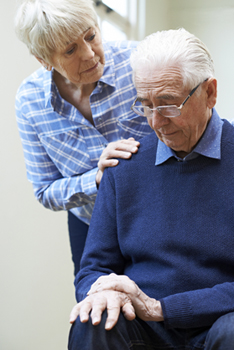Free Case Evaluation
You will never be charged a fee unless a recovery is made for you.
We are no longer accepting new cases.
Marines, their loved ones, and others who lived or worked at Camp Lejeune between August 1, 1953, and December 31, 1987, and have Parkinson’s disease are filing lawsuits. A study of more than 340,000 service members found that the risk of Parkinson’s disease was 70 percent higher for Camp Lejeune veterans than for veterans stationed elsewhere. It is believed this difference is due to contaminated water at Camp Lejeune.
The water at Camp Lejeune was contaminated with, among other pollutants, a chemical known as trichloroethylene (TCE). Tests showed that the levels of TCE in the water at Camp Lejeune between 1953 and 1987 were 70 times higher than the permissible amount.

TCE is a colorless volatile organic compound. It was widely used in industry as a cleaning agent and a degreaser, mainly for metal. TCE is also used when manufacturing some refrigerants and can be found in paints, sealants, coatings, and some automobile products like brake cleaners.
At Camp Lejeune, TCE was used, among other things, to clean machinery. It is likely the TCE contamination in the water came from that cleaning use, from spills at industrial sites on-base, and from leaks from storage drums and underground tanks. Another source of the TCE contamination was an off-base dry-cleaner named ABC One-Hour Cleaners. That dry cleaner used some of the TCE sludge left over from its cleaning process to fill potholes, and also simply dumped it into the drains. Rainwater then carried off the discarded sludge, which eventually leached into the drinking water.
TCE was first linked to Parkinson’s disease in 1969. Since then, numerous studies have indicated a link between exposure to TCE and the development of Parkinson’s disease.
Parkinson’s disease (PD) is a neurological illness that affects the nervous system. Cells in the nervous system degenerate and break down, causing the movement disorder seen in Parkinson’s patients. While the cause (or causes) of Parkinson’s remains unknown, experts believe that genetic changes, exposure to toxins, and other environmental factors play a central role. Symptoms of Parkinson’s disease develop gradually. Early signs of the disease may include:
These movement issues may only affect one side of the body early in the disease before moving to the other side as well.
Other common symptoms of Parkinson’s disease are:
Over time, dementia, delusions, and hallucinations may develop.
Other conditions can produce the same symptoms, so people experiencing those symptoms need expert medical advice and evaluation. And there is no test for Parkinson’s, so it can be difficult to diagnose, especially in its early stages.
As noted, PD is a progressive disease. It worsens over time. Experts tell us there are five stages of Parkinson’s disease:
There is no known cure for Parkinson’s disease, and treatment varies by patient according to their current symptoms. The range of treatments includes medication, surgery, physical therapy, and lifestyle changes, such as getting more rest and exercising.
Medications used for PD only treat and reduce the severity of the symptoms. People with Parkinson’s usually take a variety of medications to manage their symptoms.
The Camp Lejeune Justice Act of 2021 allows those affected by the toxic water and who lived or worked at Camp Lejeune for at least 30 consecutive days between August 1, 1953, and December 31, 1987, to file a lawsuit in federal court to be compensated for their pain and suffering and for expenses related to their diagnosis and medical treatment.
Even veterans who have had claims related to their service at Camp Lejeune denied by the Veterans Administration may qualify for compensation under this new law.
But there are strict time limits for filing a Camp Lejeune lawsuit. People diagnosed before June 2020 will have to file their lawsuit within two years. And there are other requirements, too. So, if you served or worked at Camp Lejeune between August 1, 1953, and December 31, 1987, and have been diagnosed with Parkinson’s, please contact a lawyer now.
Sources
You will never be charged a fee unless a recovery is made for you.